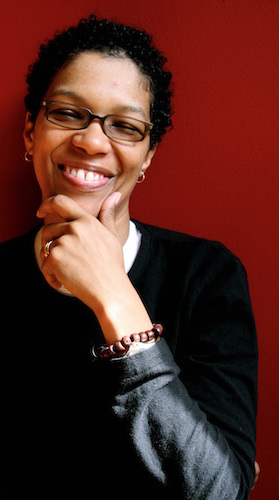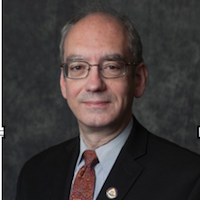Naropa University President Chuck Lief recently sat down with angel Kyodo williams, who is an American writer, ordained Zen pries and the author of Being Black: Zen and the Art of Living with Fearlessness and Grace, published by Viking Press in 2000. angel has been called “the most vocal and most intriguing African-American Buddhist in America,” and was the 2015 Lenz Foundation Distinguished Speaker at Naropa University.
~
You’ve said that “New Dharma isn’t sticky and sweet; it is raw and real.” What is “New Dharma?”
New Dharma is two things: it’s the name of my community [written as “newDharma”], and while the essence of it is the ancient wisdom, the new expression of it is very specific to the current times. It is how dharma expresses itself in this culture in this moment of time. It’s meant to relate to a different set of people with different sets of concerns and different ways of looking through the lens of the Dharma at what affects their lives.
What needs to happen so that even a well-intentioned practitioner can get their feet out of the stickiness and begin to be open to the rawness that you describe?
In the modern context, society at-large is not designed or organized in any way, shape, or form to support the Dharma. So a dharma and a way of relating to the Dharma that orients to the self only, and avoids and leaves out how dharma is expressed interpersonally and socially is a dharma that will fail in its ultimate intention, which is liberation.
Your dharma work arises in part from the Center for Transformative Change, which supports social and economic justice through community action and individual action. How does lineage and transmission add to that work?
The Center for Transformative Change is the secular expression of new dharma, It’s about taking the essence of the teachings and finding a way to express the Dharma as a human expression, without needing to hold on to the traditional language or the traditional understanding. My own experience of lineage and transmission is expressed through the lens of justice and love. I think that they’re intimately connected. Justice. Love. Liberation. Art. For me, they are all facets of the same exact thing. Or at different times, they are one thing.
Movements for change are ultimately about liberation. They tend to be about liberation from something, and I think of newDharma as liberation toward something. Liberation for liberation’s sake. Liberation for all beings, rather than liberation from a particular issue or a particular form of oppression, but liberation towards a liberation that expresses itself on the behalf of others.
There is a lineage in terms of the people who deeply practice the lineage of justice. There is a transmission that occurs, and you can see it as their work unfolds. They go from a narrow expression of justice and of what the work is about to fuller and more complete expressions.
You have taught that real change has to come from within. Can you point to what a person who bears witness to suffering in the world—but who is also a product of that suffering—should actually do to begin to create that real change?
Be with the suffering. Our culture is heavily organized to distract from the experience of suffering itself. And the first Noble Truth is to deeply understand that the nature of life is one of confusion and discomfort. In our culture, so much is oriented toward moving away from that experience and finding ways to deaden it, whether that’s through addictions to Facebook, television, drugs or alcohol.
Being with the suffering as an experience is part and parcel of what it means to live, and it radically alters our relationship to all of life and to the suffering of others. You have to figure out: “What are you rejecting, what are you not loving, and what are you not feeling?” And when you do that, you recognize that the people you dislike and the situations that you dislike…all of that drops away. When you do that, the change actually arises right there in front of you, right there within you, because you are no longer in the space of rejection and contraction, and you are not stuck. You become liberated.
~
Check out more interviews from this series:
10 Minutes With: Congressman Tim Ryan.
10 Minutes With: Motley Fool CEO & Co-Founder, Tom Gardner.
10 Minutes With: Sharon Salzberg.
10 Minutes With: Fashion Icon Eileen Fisher.
Author: Chuck Lief
Editor: Travis May
Photo: Wikimedia







Read 0 comments and reply